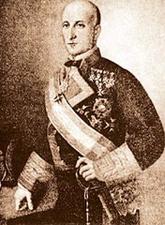José Manuel Pareja facts for kids
José Manuel de Pareja y Septien was a Spanish naval officer. He was born in Lima, Peru, on February 8, 1813. He passed away in Valparaíso, Chile, on November 28, 1865. Pareja is best known for leading the Spanish navy during the Chincha Islands War, which took place from 1864 to 1866.
Contents
Biography
José Manuel Pareja was born in Lima in 1813. His father, José Antonio Pareja, was also a military officer. After Peru gained its independence in 1821, José Manuel's family moved back to Spain. There, he decided to join the Spanish navy.
He trained on various ships and traveled to many parts of the world. One of his journeys took him all the way to the Philippines. In 1831, he took part in a training cruise aboard the frigate Perla. This ship was used as a school for young naval officers at that time.
The Chincha Islands War
In 1864, Pareja was sent to the Pacific Ocean. His mission was to take over command from another admiral, Luis Hernández-Pinzón Álvarez. The Spanish government had not approved of Pinzón's decision to take control of the Chincha Islands.
On January 27, 1865, Pareja signed a document known as the Vivanco-Pareja Treaty. Many people in Peru felt this treaty was unfair and dishonored their country. This led to a large public uprising in Peru. As a result, the government of General Juan Antonio Pezet was overthrown on July 7, 1865.
Later, Chile, which supported Peru, refused to sell supplies to the Spanish fleet. So, on September 17, 1865, Pareja sailed his fleet to Valparaíso, Chile. He demanded that Chile apologize publicly. When Chile refused his demands, Pareja declared war against them on September 24. He then began to block the main Chilean ports, trying to stop ships from entering or leaving.
Challenges and Final Days
During the last few weeks of his life, Pareja faced many difficulties in the war. On November 17, a small armed boat from his ship, the Resolution, was captured. It was taken by an Allied ship called Independencia near the port of Talcahuano. Pareja found it hard to make progress in the war with Chile. His blockade became less effective, and the sailors on his ships started to lose hope.
Admiral Pareja did not know that on November 26, the Chileans had captured a Spanish schooner called Virgen de Covadonga. This happened during the Naval Battle of Papudo. The Chileans also captured Pareja's important letters. During the battle, four Spanish sailors died and 21 were wounded. When the American Consul mentioned this news to Pareja on November 27, the Admiral was deeply affected. The loss of the Covadonga was a major blow, as it was the second Spanish warship lost in enemy waters during the conflict.
In his will, Pareja asked not to be buried in Chilean waters. Because of this wish, he was buried at sea, far from land.
See also
- Casto Méndez Núñez
- In Spanish: José Manuel Pareja para niños
 | William M. Jackson |
 | Juan E. Gilbert |
 | Neil deGrasse Tyson |


